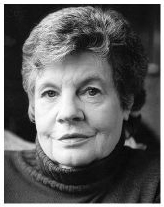Little Black Book of Stories (19 page)

“SHE USED TO SAY, Hitler had destroyed the days of her youth, and the quiet days of her marriage, and the child she might have had. And given her drama—too much drama—and dissatisfaction, and eternal restlessness, so she could never be content. She thought these thoughts with great violence, most especially when she was living the quiet days that were simply a
semblance
of quiet days, a simulacrum of a life, so to speak. Though if a kitchen and a plate of macaroni cheese are a phantasm maybe, just maybe, they are more exciting than when they stretch before you as your settled and invariable fate.”
“As it is now,” he said. Thinking of custard on the floor.
“The worst time—the most unreal—was his, was your, embarkation leave. Before you went where you couldn’t say where you were going, where the orange groves and the lemons bloomed. So you sat both, day by day, for those two weeks, and she watched the clock ticking, and mended your shirt-collar like a wax doll housewife with her head bent over the darning mushroom in the dusty blue heels. And you went out now and then together to survey the damage—churches burst open like smashed fruit, plate glass glittering on pavements the length of Oxford Street and Knights-bridge, and you talked rather carefully of nothing much, as though there was a competition in banality. And when you left, she knew she was not pregnant, and gave you a little peck on the cheek—
acting
the little English wife—no Romeo and Juliet kissing—and off you went, with your kit-bag, into the dark, temporary or permanent.”
“Yes,” said James.
“Yes,” she said. “And then she lay on the floor and howled like an animal, rolled up and down as though she was in extreme agony. And then she got up and had a bath, and painted her toenails and fingernails with her remaining varnish, and rough-dried her hair, and turned on some soothing music, and became— someone else.
“And then the doorbell rang. And there you were—there
he
was—on the doorstep. She thought it was a ghost. The world was full of the walking dead in those days.”
“The embarkation was cancelled,” said James, reasonably then, reasonably now.
“So she hit out, at the smiling face, with all her strength.”
“And drew blood,” said James. “With her wedding ring.”
“And kissed the blood,” said Dido, “and kissed and kissed the mark her hand had made.”
“But we survived,” said James. He said, “Coming back, being a revenant, was always dangerous. I remember arriving at night back in 1943 when the V-1s were falling. I remember arriving at night—I’d hitched a lift in a troop-lorry—and being put down near some depot at Waterloo. There weren’t any buses or taxis to be had, and the sounds of what might have been them approaching in the blackout were sometimes those damned flying bombs, like monstrous clockwork, that ticked and then went out. And then exploded. And the sky was full of flames and smoke, colours you couldn’t see now, because the sky is always red over London and you can’t see the stars. Those things didn’t need the full moon, like the bombers did, but we still felt uneasy when it was full. It was full moon that night. So I walked, carrying as much of my kit as I could, falling into potholes, and listening for the damned things. And when I’d walked for an hour or two, I saw I was walking in the general direction of a steady blaze. Tongues licking up, that
glow,
brick-dust in the air, walls hot to the touch. And the closer I got to home, the closer to the crater, so to speak. And I came up against barriers, and bucket-chains, and one fire-engine feebly spraying. And I ran. I ran up against the barriers, and the wardens tried to turn me back, and I said, that’s my house, my wife’s in there. And I pushed someone over, and ran into the dust. And saw the house was a shell. The roof and the bedrooms were rubble on the downstairs rooms. I thought she must be in the shelter, and I started pulling at bricks, and burned beams, and I burned my hands. And they pulled at me from behind, shouting. And I saw the pit in the living-room floor, and there was someone pulling at my collar. So I looked up, and there she was, in a nightdress shredded to ribbons by glass and a fireman’s jacket, with her hair burned to a birdsnest and her face black as night with no eyebrows—and sooty hot hands with broken nails—”
“There was nothing left,” said Dido. “Except each other.” She said, “You said you were Aeneas looking for Creusa in burning Troy. And she said to you, ‘I’m not a ghost, I’m flesh and blood.’ And they kissed, with soot on their tongues, and the burning city in their lungs. Flesh and blood.”
James began to shake. He was exceedingly tired and confused and somehow certain that all this presaged his own death, or madness at least, and if he went mad or died, what would become of mad Mado?
“Who are you?” he said, in a tired old voice. “Why are you here?”
“Don’t you know?” she said kindly. “I am the Fetch.”
“Fetch?”
She sat in his chair, smiling and waiting, sleek and dark in red silk.
“Madeleine?” said James.
“In a sense. You would never listen to anything about spiritual things. You always made cynical jokes, when it was a question of astrology, or clairvoyance, or the otherworld.”
“Astronomy is mystery enough,” said James as he always said. “A great mystery. We used to fly under the stars thick as daisies. You can’t see them now.”
“There are many things in heaven and earth you can’t
see,
James. The etheric body can get separated from—from the clay. It can wander in churchyards. It needs to be set free. As she needs to be set free.”
“I know what you are telling me,” said James. “You must know I’ve thought about it.”
“You don’t do it, because you would be set free yourself, and you think that would be wrong. But you don’t think of her, or you would know what she wants. What I want.”
“Dido,” said James, using the name for the first time. “She doesn’t know what she wants, she can’t rightly want or not want, her skull is full of plaques and tangles—”
“You make me angry,” said Dido in Madeleine’s voice. “All those young Germans in the war, with their lives in front of them, and their girls and their parents, that was all right, your own young pilots on missions with wonderful brains humming with cleverness and hope and rational fear—
that
was all right. But a miserable hulk decorated with a pink ribbon—”
“You could always twist anything.”
“Intelligence. O yes. I could always twist anything.”
She stood up to go. James stood up to see her out. He meant not to say anything, to be strong, but he heard his own voice,
“Shall I see you again?”
Black silk hair, red silk dress, anachronistic silk stockings with perfect seams up the perfect legs.
“That depends,” said Dido. “As you know. That depends.”
The next day, he knew she had been there, for the signs were solid. Lipstick on the whisky glass, beribboned chocolates, little red Po smiling at him in her polythene casing. He imagined that Deanna Bright looked at him oddly. She refused a chocolate when he offered one. She picked up Po with sturdy black fingers.
“Shall I get it out, then?”
“No,” he said. “No, leave it in the bag for the present.”
“I see you had company again,” said Deanna Bright.
“Yes,” said James.
Deanna Bright shrugged and left rather early.
On the television, in broad daylight, the Teletubbies were sitting on the end of their casket-shaped cradles, swathed in shimmering coverlets like parachute silk, or those silvery blankets wrapped around those rescued from hypothermia or drowning. They lay down to sleep like nodding ninepins, each snoring his or her differentiated snore. Nightnight Teletubbies said the mid-Atlantic motherly voice in the cathode tubing. Night, said mad Mado, more and more angrily, night, night, night, night, night.
“Come to bed,” said James, very gently, adjusting the pink ribbon.
“Night,” said Mado.
“Just a rest, for a while,” said James.
Acknowledgements
THERE ARE MANY PEOPLE I should like to thank for help with these stories. I am particularly grateful to Danielle Olsen, who made real my imagined work of art with the help of the Wellcome Collection. I am also grateful to Siân Ede, whose knowledge of contemporary art was invaluable, and whose opinions are tough. Dr. Hamish McMichen was most helpful with medical matters—my mistakes are my own. “A Stone Woman” is dedicated to Torfi Tulinius, whose scholarly knowledge of Iceland and love of its landscape made me
see
the country. I am grateful to Dominic Gregory for commissioning “Raw Material” to be read aloud at the Ilkley Literature Festival. Harriet Harvey-Wood, Ignês Sodré, and my editor Jenny Uglow will know what more than one of the stories owes to talking to them. My daughters Antonia and Miranda were helpful with Teletubbies; Miranda also helped with body-piercing.
I am, as always, grateful to my publishers, Chatto and Windus and Vintage, in England, and Knopf and Vintage in the United States. Also to my agents, Peters Fraser and Dunlop in the UK and Sterling Lord Literistic in the States. My assistant, Lindsey Andrews, makes writing possible.
Finally, this book is dedicated to my German translator and to my Italian translators, all good friends and precise readers. Talking to them over the years has changed my writing, and my reading.

A. S. BYATT
Little Black Book of Stories
A. S. Byatt is the author of numerous novels, including
A Whistling Woman
and
Possession,
which was awarded the Booker Prize in 1990. She has also written two novellas, published together as
Angels & Insects,
four previous collections of shorter works, and several works of nonfiction. Educated at Cambridge, she was a senior lecturer in English at University College, London. She lives in London.

ALSO BY A. S. BYATT
Fiction
The Shadow of the Sun
The Game
The Virgin in the Garden
Still Life
Sugar and Other Stories
Possession: A Romance
Angels & Insects
The Matisse Stories
The Djinn in the Nightingale’s Eye
Babel Tower
Elementals
The Biographer’s Tale
A Whistling Woman
Vintage Byatt
Criticism
Degrees of Freedom: The Novels of Iris Murdoch
Unruly Times: Wordsworth and Coleridge
Passions of the Mind: Selected Writings
Imagining Characters
(with Ignês Sodré)
On Histories and Stories: Selected Essays
Portraits in Fiction

FIRST VINTAGE INTERNATIONAL EDITION, MARCH 2005
Copyright © 2003 by A. S. Byatt
Vintage is a registered trademark and Vintage International and
colophon are trademarks of Random House, Inc.
The Library of Congress has cataloged the Knopf edition as follows:
Byatt, A.S. (Antonia Susan), [date]
Little black book of stories / A. S. Byatt.—1st ed.
p. cm.
Contents: The thing in the forest—Body art—A stone woman—
Raw material—The pink ribbon.
I. Title.
PR6052.Y2L58 2004
823’.914—dc22
2003065940
eISBN: 978-0-307-42663-5
v3.0